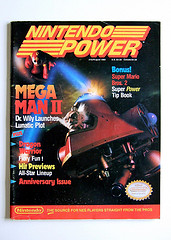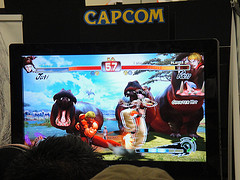Capcom’s Director of Community, Seth Killian Interviewed by Nintendo Power
If you’re reading this site, chances are that you know that I do something with online communities. You might know that I’ve been managing online communities for 10 years and that I wrote a book about it. In short, online community is a passion for me.
But, long before I managed any online communities, I was a Nintendo Power subscriber. I don’t remember exactly how long I subscribed, but it was something like volume 20 through 80, which according to The Video Game Museum, would take us from January 1991 (when I was 7) through January 1996.
At that point in my life, my subscription was based around my birthday or Christmas and if my parents would renew it. At some point, it lapsed.
A few years ago, for whatever reason, I thought of Nintendo Power. I had always thought I’d resubscribe one day. Maybe it was the Wii. Maybe it was my youngest brother getting older and getting into gaming more and more. But, I subscribed again and have read every issue since.
It’s actually been really fun lately as my brother didn’t realize I had such a big stash of old Nintendo Power issues until a couple of months ago. I got them out and he has been reading them ever since (he only has a few left). It’s been amazing to see his interest in them and it has been special to be able to share that, as we laugh at random oddities, funny ads and the like.
The latest issue, number 261, arrived a few days ago and I started reading it. Most of the time, I will read the Power Profiles section, as it features an interview with, more often than not, some video game developer or industry person that I find interesting.
So, I opened this month’s profile and I see this job title: “Strategic Director, Online and Community, Capcom.” Wait. What? A community professional is the “Power Profile” in Nintendo Power? Well, there you have it. We have done it! It’s mainstream. Take that.
Of course, I’m (kind of) joking. But, it is pretty awesome to see this. Feel free to laugh at me, but this does mean something to me. It is the first time that the magazine, at least that I can recall in the time I have been reading it, has shone such a spotlight on a professional in this space and that is pretty cool.
His name is Seth Killian, also known in the gaming community as s-kill. Beyond the community aspects of his job, he also serves as a “Special Combat Advisor” at Capcom. The final boss of “Street Fighter IV” was named after him (a much bigger deal than being the first community professional spotlighted in Nintendo Power, but whatever). However, his primary role is with Capcom’s online community. He’s worked with them since 2006 and many interviews simply refer to him as a community manager at the company.
In the interview, he speaks about his background, how he ended up at Capcom, the video game industry and how he interacts with Capcom’s fans and greater online community.
How did he come to work from the company? He used to organize large “Street Fighter” tournaments (which would eventually form into the Evo Championship Series) and he’d go to E3 (the Electronic Entertainment Expo, gaming’s premier conference) every year. He says that one year, a friend suggested he ask Capcom if they’d be willing to give him some prizes to give away at the tournament.
The first time he asked, they told him to “buzz off,” in his words. The second year, he received the same treatment. But, the third year, he connected with someone. Capcom supported the tournament and, eventually, he was offered a job with the company.
A big congratulations to Mr. Killian on the honor and his success. He gave a lot of great answers (pick up the issue for the interview), but among my favorites was his answer to this question:
“How has your perspective on the gaming industry changed from when you were a fan now that you’re looking at things from the other side?”
“I see a lot of “bigger picture” elements that can shape a corporate strategy, and how internal politics and personalizes can affect decisions,” he said. “But mostly I work hard to not let my “insider” knowledge change the way I think too much. I never want to lose that crazy love for the games that brought me this far. You can’t appreciate fully the feelings of your fans if you’re not still a fan yourself.“


